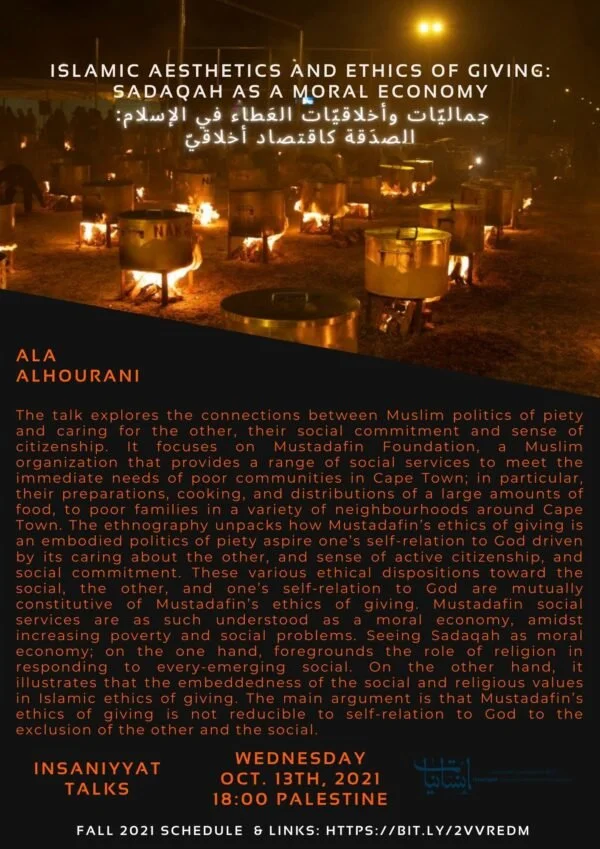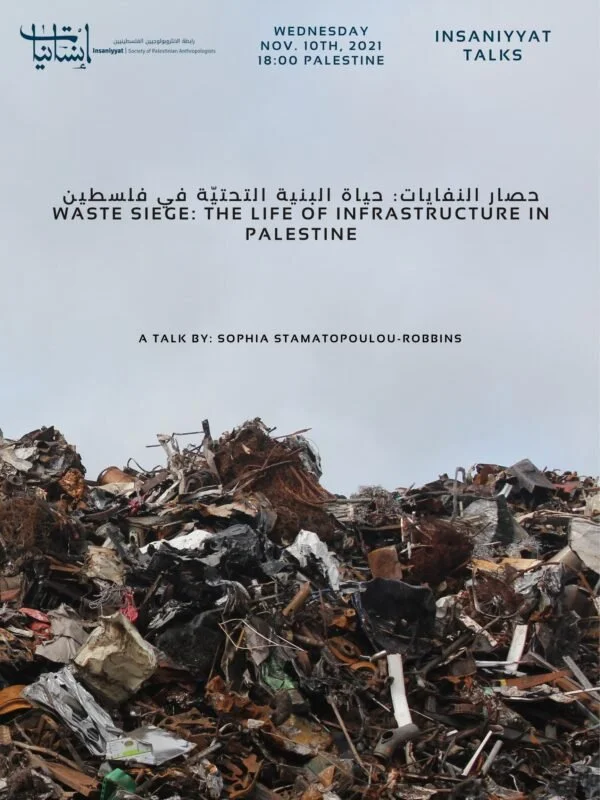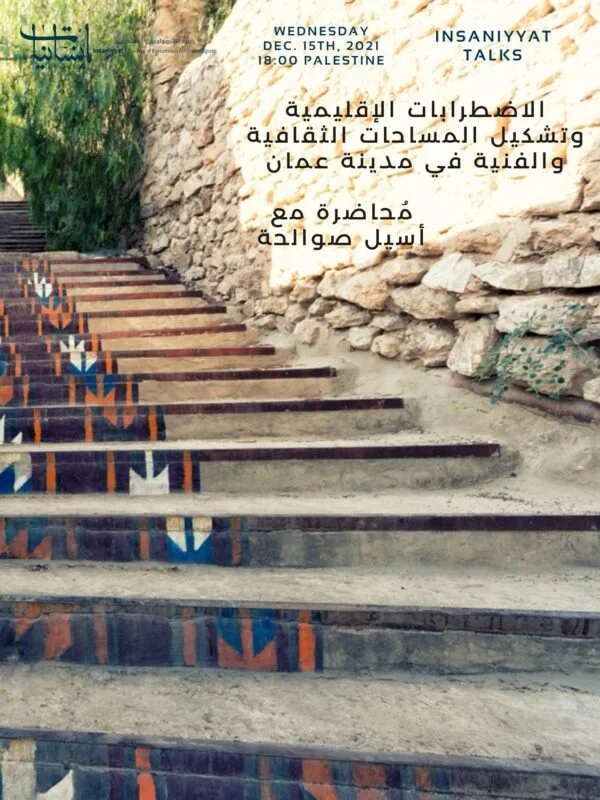Insaniyyat Talks: Fall 2021
Gaza as Southern Palestine
غزة، فلسطين الجنوبية
Wednesday 8th September, 6 p.m (Palestine time) – Anthropologist Hadeel Assali
Abstract
In this talk, anthropologist Hadeel Assali argues for the geographical unmapping of the Gaza Strip through both historical and ethnographic study. Rather than taking the territorial entity for granted, ethnography and history instead bring into relief a geography of Gaza that is much more broad, which Assali refers to as Southern Palestine. Dominant and even critical discourses have kept Gaza trapped in "the Gaza Strip" while focusing almost solely on Israeli techniques of domination. However, the framework of "relational place-making" allows us to center and amplify Palestinians in Gaza as active agents in shaping and reshaping the world (and the material earth) around them.
Islamic Aesthetics and Ethics of Giving: Sadaqah as a Moral Economy
جماليّات وأخلاقيّات العطاء في الإسلام: الصدقة كاقتصاد الأخلاقي
Wednesday 13th October, 6 p.m (Palestine time) – Anthropologist Ala Alhourani
Abstract
The talk explores the connections between Muslim politics of piety and caring for the other, their social commitment and sense of citizenship. It focuses on Mustadafin Foundation, a Muslim organization that provides a range of social services to meet the immediate needs of poor communities in Cape Town; in particular their preparations, cooking, and distributions of a large amounts of food, to poor families in a variety of neighbourhoods around Cape Town. The ethnography unpacks how Mustadafin’s ethics of giving is an embodied politics of piety aspire one’s self-relation to God driven by its caring about the other, and sense of active citizenship, and social commitment. These various ethical dispositions toward the social, the other, and one’s self-relation to God are mutually constitutive of Mustadafin’s ethics of giving. Mustadafin social services are as such understood as a moral economy, amidst increasing poverty and social problems. Seeing Sadaqah as moral economy; on the one hand, foregrounds the role of religion in responding to every-emerging social. On the other hand, it illustrates that the embeddedness of the social and religious values in Islamic ethics of giving. The paper main argument is that Mustadafin’s ethics of giving is not reducible to self-relation to God to the exclusion of the other and the social.
Waste Siege: The Life of Infrastructure in Palestine
حصار النفايات: حياة البنية التحتية في فلسطين
Wednesday 10th November, 6 p.m (Palestine time) – Anthropologist Sophia Stamatopoulou-Robbins
Abstract
Based on her book, Waste Siege: The Life of Infrastructure in Palestine, Sophia Stamatopoulou-Robbins in this talk offers an analysis unusual in the study of Palestine: it begins with the environmental, infrastructural, and aesthetic context in which Palestinians forge their lives, naming that context a “waste siege.” The author argues that to speak of waste siege is to describe a series of conditions, from smelling wastes to negotiating military infrastructures, from biopolitical forms of colonial rule to experiences of governmental abandonment, from obvious targets of resistance to confusion over responsibility for the burdensome objects of daily life. She focuses on waste as an experience of everyday life that is continuous with, but not a result only of, occupation. Tracing Palestinians' experiences of wastes over the past decade, and their improvisations for mitigating the effects of this siege, this ethnography considers how multiple authorities governing the West Bank—including municipalities, the Palestinian Authority, international aid organizations, and Israel—rule by waste siege, whether intentionally or not. The talk depicts waste's constant returns. It thus challenges both common formulations of waste as "matter out of place" and as the ontological opposite of the environment, by suggesting instead that waste siege be understood as an ecology of "matter with no place to go." Waste siege thus not only describes a stateless Palestine, but also becomes a metaphor for our besieged planet.
Regional Turmoil and the Formation of Artistic and Cultural Spaces in the City of Amman
الاضطرابات الإقليمية وتشكيل المساحات الثقافية والفنية في مدينة عمان
Wednesday 15th December, 6 p.m (Palestine time) – Anthropologist Aseel Sawalha
المُلخّص
في السنوات العشرين الأخيرة بدأت العديد من المؤسسات والمراكز التي تعتني بالفن والثقافة في مدينة عمان. وترافق هذا مع ظهور حيز مكاني أتاح التبادل الثقافي لمجموعة باتت تعرف عن نفسها بانتمائها للمدينة عمان. في هذه المحاضرة سأحاول الإجابة عن الأسئلة التالية: ما هي علاقة نمو الحركة الفنية والثقافية في مدينة عمان بالظروف الإقليمية (الحرب الامريكية ضد العراق، والحرب في سوريا – ووجود اللاجئين العراقيين والسوريين في الأردن)، ما هو الدور الذي تقوم به النساء من الطبقات الأكثر حظا في تشكيل الحركة الثقافية والفنية في المدينة؟ ولماذا؟ ما هي علاقة عمان بالمدن الإقليمية؟ كيف يمكن فهم الحركة الفنية والثقافية في عمان ضمن إطار "الحق في المدينة"؟




